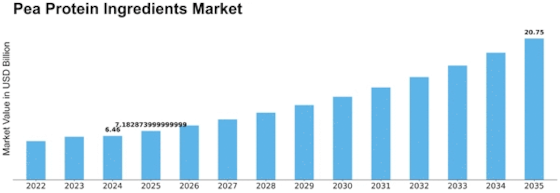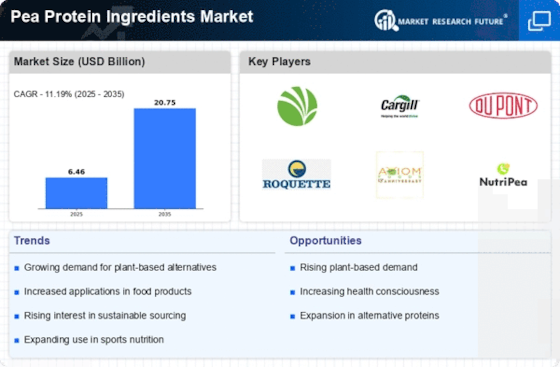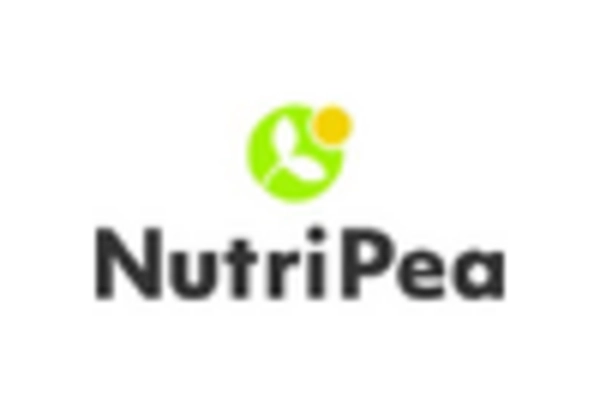-
EXECUTIVE SUMMARY
-
Market Attractiveness Analysis
- Global Pea Protein Ingredients Market, by Type
- Global Pea Protein Ingredients Market, by Application
- Global Pea Protein Ingredients Market, by Region
-
MARKET INTRODUCTION
-
Definition
-
Scope of the Study
-
Market Structure
-
Key Buying Criteria
-
Macro Factor Indicator Analysis
-
RESEARCH METHODOLOGY
-
Research Process
-
Primary Research
-
Secondary Research
-
Market Size Estimation
-
Forecast Model
-
List of Assumptions
-
MARKET DYNAMICS
-
Introduction
-
Drivers
-
Restraints
-
Opportunities
-
Challenges
-
MARKET FACTOR ANALYSIS
-
Value Chain Analysis
-
Supply Chain Analysis
-
Porter’s Five Forces Model
- Bargaining Power of Suppliers
- Bargaining Power of Buyers
- Threat of New Entrants
- Threat of Substitutes
- Intensity of Rivalry
-
GLOBAL PEA PROTEIN INGREDIENTS MARKET, BY TYPE
-
Introduction
-
Isolates
- Isolates: Market Estimates & Forecast, by Region/Country, 2023–2032
-
Concentrates
- Concentrates: Market Estimates & Forecast, by Region/Country, 2023–2032
-
Textured
- Textured: Market Estimates & Forecast, by Region/Country, 2023–2032
-
GLOBAL PEA PROTEIN INGREDIENTS MARKET, BY APPLICATION
-
Introduction
-
Food & Beverages
- Food & Beverages: Market Estimates & Forecast, by Country, 2023–2032
- Meat Substitutes
- Bakery & Confectionery
- Beverages
- Dietary Supplements
- Sweet & Savory Snacks
- Infant Nutrition
- Others
-
Animal Feed
- Animal Feed: Market Estimates & Forecast, by Region/Country, 2023–2032
-
Others
- Others: Market Estimates & Forecast, by Region/Country, 2023–2032
-
GLOBAL PEA PROTEIN INGREDIENTS MARKET, BY REGION
-
Introduction
-
North America
- Market Estimates & Forecast, by Type, 2023–2032
- Market Estimates & Forecast, by Application, 2023–2032
- Market Estimates & Forecast, by Country, 2023–2032
- US
- Canada
- Mexico
-
Europe
- Market Estimates & Forecast, by Type, 2023–2032
- Market Estimates & Forecast, by Application, 2023–2032
- Market Estimates & Forecast, by Country, 2023–2032
- Germany
- UK
- France
- Spain
- Italy
- Rest of Europe
-
Asia-Pacific
- Market Estimates & Forecast, by Type, 2023–2032
- Market Estimates & Forecast, by Application, 2023–2032
- Market Estimates & Forecast, by Country, 2023–2032
- China
- Japan
- India
- Australia & New Zealand
- Rest of Asia-Pacific
-
Rest of the World
- Market Estimates & Forecast, by Type, 2023–2032
- Market Estimates & Forecast, by Application, 2023–2032
- Market Estimates & Forecast, by Region, 2023–2032
- South America
- Middle East
- Africa
-
COMPETITIVE LANDSCAPE
-
Introduction
-
Competitive Benchmarking
-
Development Share Analysis
-
Key Developments & Growth Strategies
-
COMPANY PROFILES
-
Archer Daniels Midland Company
- Company Overview
- Financial Overview
- Products Offered
- Key Developments
- SWOT Analysis
- Key Strategies
-
Kerry Group PLC
- Company Overview
- Financial Overview
- Products Offered
- Key Developments
- SWOT Analysis
- Key Strategies
-
Cargill Incorporated
- Company Overview
- Financial Overview
- Products Offered
- Key Developments
- SWOT Analysis
- Key Strategies
-
The Scoular Company
- Company Overview
- Financial Overview
- Products Offered
- Key Developments
- SWOT Analysis
- Key Strategies
-
A & B Ingredients Inc
- Company Overview
- Financial Overview
- Products Offered
- Key Developments
- SWOT Analysis
- Key Strategies
-
Cosucra Groupe Warcoing SA
- Company Overview
- Financial Overview
- Products Offered
- Key Developments
- SWOT Analysis
- Key Strategies
-
Nutri-Pea Limited
- Company Overview
- Financial Overview
- Products Offered
- Key Developments
- SWOT Analysis
- Key Strategies
-
Burcon NutraScience Corporation
- Company Overview
- Financial Overview
- Products Offered
- Key Developments
- SWOT Analysis
- Key Strategies
-
Roquette Frères S.A.
- Company Overview
- Financial Overview
- Products Offered
- Key Developments
- SWOT Analysis
- Key Strategies
-
Reliance Private Label Supplements
- Company Overview
- Financial Overview
- Products Offered
- Key Developments
- SWOT Analysis
- Key Strategies
-
Ingredion Incorporated
- Company Overview
- Financial Overview
- Products Offered
- Key Developments
- SWOT Analysis
- Key Strategies
-
Batory Foods
- Company Overview
- Financial Overview
- Products Offered
- Key Developments
- SWOT Analysis
- Key Strategies
-
Cambridge Commodities Inc
- Company Overview
- Financial Overview
- Products Offered
- Key Developments
- SWOT Analysis
- Key Strategies
-
PLT Health Solutions
- Company Overview
- Financial Overview
- Products Offered
- Key Developments
- SWOT Analysis
- Key Strategies
-
Axiom Foods, Inc.
- Company Overview
- Financial Overview
- Products Offered
- Key Developments
- SWOT Analysis
- Key Strategies
-
APPENDIX
-
General Types & References
-
List of Abbreviation
-
-
LIST OF TABLES
-
Global Pea Protein Ingredients Market, by Region, 2023–2032 (USD Million)
-
Global Pea Protein Ingredients Market, by Type, 2023–2032 (USD Million)
-
Global Pea Protein Ingredients Market, by Application, 2023–2032 (USD Million)
-
North America: Pea Protein Ingredients Market, by Country, 2023–2032 (USD Million)
-
North America: Pea Protein Ingredients Market, by Type, 2023–2032 (USD Million)
-
North America: Pea Protein Ingredients Market, by Application, 2023–2032 (USD Million)
-
US: Pea Protein Ingredients Market, by Type, 2023–2032 (USD Million)
-
US: Pea Protein Ingredients Market, by Application, 2023–2032 (USD Million)
-
Canada: Pea Protein Ingredients Market, by Type, 2023–2032 (USD Million)
-
Canada: Pea Protein Ingredients Market, by Application, 2023–2032 (USD Million)
-
Mexico: Pea Protein Ingredients Market, by Type, 2023–2032 (USD Million)
-
Mexico: Pea Protein Ingredients Market, by Application, 2023–2032 (USD Million)
-
Europe: Pea Protein Ingredients Market, by Country, 2023–2032 (USD Million)
-
Europe: Pea Protein Ingredients Market, by Type, 2023–2032 (USD Million)
-
Europe: Pea Protein Ingredients Market, by Application, 2023–2032 (USD Million)
-
Germany: Pea Protein Ingredients Market, by Type, 2023–2032 (USD Million)
-
Germany: Pea Protein Ingredients Market, by Application, 2023–2032 (USD Million)
-
France: Pea Protein Ingredients Market, by Type, 2023–2032 (USD Million)
-
France: Pea Protein Ingredients Market, by Application, 2023–2032 (USD Million)
-
Italy: Pea Protein Ingredients Market, by Type, 2023–2032 (USD Million)
-
Italy: Pea Protein Ingredients Market, by Application, 2023–2032 (USD Million)
-
Spain: Pea Protein Ingredients Market, by Type, 2023–2032 (USD Million)
-
Spain: Pea Protein Ingredients Market, by Application, 2023–2032 (USD Million)
-
UK: Pea Protein Ingredients Market, by Type, 2023–2032 (USD Million)
-
UK: Pea Protein Ingredients Market, by Application, 2023–2032 (USD Million)
-
Rest of Europe: Pea Protein Ingredients Market, by Type, 2023–2032 (USD Million)
-
Rest of Europe: Pea Protein Ingredients Market, by Application, 2023–2032 (USD Million)
-
Asia-Pacific: Pea Protein Ingredients Market, by Country, 2023–2032 (USD Million)
-
Asia-Pacific: Pea Protein Ingredients Market, by Type, 2023–2032 (USD Million)
-
Asia-Pacific: Pea Protein Ingredients Market, by Application, 2023–2032 (USD Million)
-
China: Pea Protein Ingredients Market, by Type, 2023–2032 (USD Million)
-
China: Pea Protein Ingredients Market, by Application, 2023–2032 (USD Million)
-
India: Pea Protein Ingredients Market, by Type, 2023–2032 (USD Million)
-
India: Pea Protein Ingredients Market, by Application, 2023–2032 (USD Million)
-
Japan: Pea Protein Ingredients Market, by Type, 2023–2032 (USD Million)
-
Japan: Pea Protein Ingredients Market, by Application, 2023–2032 (USD Million)
-
Australia & New Zealand: Pea Protein Ingredients Market, by Type, 2023–2032 (USD Million)
-
Australia & New Zealand: Pea Protein Ingredients Market, by Application, 2023–2032 (USD Million)
-
Rest of Asia-Pacific: Pea Protein Ingredients Market, by Type, 2023–2032 (USD Million)
-
Rest of Asia-Pacific: Pea Protein Ingredients Market, by Application, 2023–2032 (USD Million)
-
Rest of the World (RoW): Pea Protein Ingredients Market, by Country, 2023–2032 (USD Million)
-
Rest of the World (RoW): Pea Protein Ingredients Market, by Type, 2023–2032 (USD Million)
-
Rest of the World (RoW): Pea Protein Ingredients Market, by Application, 2023–2032 (USD Million)
-
South America: Pea Protein Ingredients Market, by Type, 2023–2032 (USD Million)
-
South America: Pea Protein Ingredients Market, by Application, 2023–2032 (USD Million)
-
Middle East: Pea Protein Ingredients Market, by Type, 2023–2032 (USD Million)
-
Middle East: Pea Protein Ingredients Market, by Application, 2023–2032 (USD Million)
-
Africa: Pea Protein Ingredients Market, by Type, 2023–2032 (USD Million)
-
Africa: Pea Protein Ingredients Market, by Application, 2023–2032 (USD Million)
-
LIST OF FIGURES
-
Global Pea Protein Ingredients Market Segmentation
-
Forecast Research Methodology
-
Five Forces Analysis of the Global Pea Protein Ingredients Market
-
Value Chain of the Global Pea Protein Ingredients Market
-
Share of the Global Pea Protein Ingredients Market in 2020, by Country (%)
-
Global Pea Protein Ingredients Market, by Region, 2023–2032,
-
Global Pea Protein Ingredients Market Size, by Type, 2020
-
Share of the Global Pea Protein Ingredients Market, by Type, 2023–2032 (%)
-
Global Pea Protein Ingredients Market Size, by Application, 2020
-
Share of the Global Pea Protein Ingredients Market, by Application, 2023–2032 (%)



















Leave a Comment